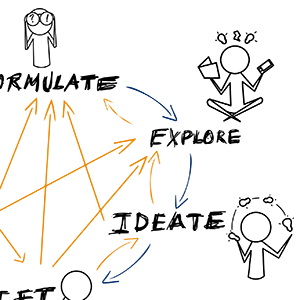Executive Function

Problem Solving Through the Design Process

Building Executive Function in Remote Learners

Social Emotional Learning in a Hybrid Learning Environment





Grounded in IDE Corp.’s 7 Essential Elements for ELL Support, this course equips educators with practical scaffolding strategies to enhance English Language Learners’ (ELLs) comprehension and engagement. Participants will explore structured supports while providing students with independent learning resources through differentiated instruction to create inclusive learning environments that foster academic success and language development.
Syllabus:
As more schools honor brain research by offering students longer class periods and fewer courses per day, teachers must rethink how they use time for teaching and learning. This five-week course will explore two models for teaching in a block schedule, providing educators with strategies to maximize student engagement and deepen learning. Participants will design units and lessons tailored for extended periods, whether envisioning a fluid, student-driven approach or a structured beginning-middle-end format. Through hands-on planning and practical applications, this course will position educators to enhance learning and make the most of block scheduling.
Syllabus
Participants in this course will use Students Taking Charge in Grades 6-12 by Dr. Nancy Sulla as a resource. The assigned book must be purchased in advance. Access to MyQPortal is included for all participants while enrolled in the VLC.
As a teacher’s aide, you are an essential part of the classroom community, providing the support that helps students flourish and teachers succeed. Throughout this course, we’ll explore the vital responsibilities of teacher’s aides, from effective collaboration with teachers, administrators, and parents, to supporting students with diverse learning needs. We’ll examine how you contribute to differentiated instruction, cultural responsiveness, and the success of students with IEPs and 504 plans.
Syllabus:
Access to MyQPortal is included for all participants while enrolled in the VLC.
“Work smarter, not harder!” AI tools give us the power to do just that. The possibilities are endless! Explore the opportunities for using AI-driven tools to design rubrics, protocols, instructional activities, and more! Also, generate higher-order questions while engaging with your class and write your talking points for lessons and videos. Learn the nuances of using AI as your instructional design assistant and your power partner in the classroom to meet individual student needs through greater personalized learning.
Syllabus:
Access to MyQPortal is included for all participants while enrolled in the VLC.
In this flexible course, you will consider your role as a teacher leader and future administrator through the lens of Ten Mindsets of Transformational Leadership as outlined in Students Taking Charge: Implementation Guide for Leaders. Then, you will identify a focus area for promoting leadership skills in others: your students, your colleagues, a committee, your department, etc. In the process, you will gain tools, insights, and leadership skills to take action as a transformational leader while building leadership capacity in students and colleagues.
Syllabus:
Participants in this course will use Students Taking Charge: Implementation Guide for Leaders by Dr. Nancy Sulla, Tanya Bosco, and Julie Marks as a resource. The assigned book must be purchased in advance. Access to MyQPortal is included for all participants while enrolled in the VLC.
In this course featuring flexible time engagement to meet the needs of school and district leaders, you will consider your role as an administrator through the lens of Ten Mindsets for Transformational Leadership as outlined in Students Taking Charge: Implementation Guide for Leaders.* Start from day one of the course to build your own Mindset-Driven Leadership Toolkit as you gather tools and insights to take action in your learning community and enhance your leadership skills, leaving a legacy of influence.
Syllabus:
Participants in this course will use Students Taking Charge: Implementation Guide for Leaders by Dr. Nancy Sulla, Tanya Bosco, and Julie Marks as a resource. The assigned book must be purchased in advance. Access to MyQPortal is included for all participants while enrolled in the VLC.
Explore the power of the 6 Ps of PBL. Design a PBL task, a rubric to drive instruction, a scaffold of rich and diverse learning activities to implement with your students, and a plan for facilitating the learning.
Syllabus:
Participants in this course will use Dr. Nancy Sulla’s book Students Taking Charge as a resource. The assigned book must be purchased in advance. Access to MyQPortal is included for all participants while enrolled in the VLC.
How can you ensure that each of your learners is able to access learning and succeed in any learning environment? How can teachers make the most of their time with students to cover a lot of curriculum? The teacher’s role as a facilitator of learning has become more relevant than ever. Explore strategies to help students navigate their learning environment to build academic resilience, accelerate student learning through a focus on the power standards, and support social-emotional learning and executive function. This course will help you rethink instruction to prioritize differentiation and scaffolds that will meet all learners’ needs. Participants will deconstruct their curriculum to identify and teach to the power standards in ways that build foundational standards in the process.
Syllabus:
Participants in this course will use Reinventing the Classroom Experience by Dr. Nancy Sulla as a resource. The assigned book must be purchased in advance. Access to MyQPortal is included for all participants while enrolled in the VLC.
Social and emotional learning (SEL) plays a major role in one’s success in life and career. Being in touch with emotions, controlling them, setting and achieving goals, engaging with others in socially appropriate ways, demonstrating empathy toward others, establishing positive relationships, and taking responsibility in life are critical skills that are not necessarily included in your current curriculum. In this course, participants will develop strategies to promote self-awareness, self-management, social awareness, relationship, and responsible decision-making skills in a student-driven learning environment.
Syllabus:
Participants in this course will use Dr. Nancy Sulla’s book Reinventing the Classroom Experience as a resource. The assigned book must be purchased in advance. Access to MyQPortal is included for all participants while enrolled in the VLC.
Explore the structures and strategies you can use to gather formative assessment data to drive instruction that is targeted for increased student achievement. Design formative assessments for use with your students that can be used remotely or in person.
Syllabus:
Participants in this course will use Dr. Nancy Sulla’s book Reinventing the Classroom Experience as a resource. The assigned book must be purchased in advance. Access to MyQPortal is included for all participants while enrolled in the VLC.
Deepen your knowledge of the power of PBL with a focus on implementation strategies. Design differentiated digital activity lists with multiple ways for students to learn, develop content facilitation grids and questions to support student-driven learning, and implement four types of formative assessments throughout the PBL unit. Note: Participants will apply course content to a previously created PBL task and rubric.
Syllabus:
This course will use Dr. Nancy Sulla’s book Students Taking Charge as a resource. The assigned book must be purchased in advance. Access to MyQPortal is included for all participants while enrolled in the VLC.
Executive function is critical to students’ academic achievement and social-emotional learning. Focusing, shifting attention from one activity to another, working toward a goal, persisting in a task, catching and correcting errors, and managing time are all executive function skills that students need to be successful in any learning environment. The sudden shift to remote learning during the pandemic transformed education. Executive function skills often determined student resilience and success. The good news is that executive function skills can be developed and accelerated. Participants will explore six key life skill areas that are uniquely supported by executive function and design instructional plans to intentionally build these critical achievement prerequisites in all learners.
Syllabus:
Participants in this course will use Dr. Nancy Sulla’s book Building Executive Function: The Missing Link to Student Achievement as a resource. The assigned book must be purchased in advance. Access to MyQPortal is included for all participants while enrolled in the VLC.
Creating a learner-centered classroom requires teachers to design opportunities for students to actively engage in their learning and maximize their potential. Designing differentiated learning activities, facilitating those learning activities with meaningful questioning, using a variety of formative assessment strategies and student reflections, and leveraging strategies to build students’ executive function skills all lead to putting students at the center of their educational process. Craft a plan for positioning your students to be active participants in the learning process as you design a classroom learning environment that engages and empowers students, building a greater sense of efficacy for them and for you as their teacher.
Syllabus:
Participants in this course will use Dr. Nancy Sulla’s book It’s Not What You Teach But How as a resource. The assigned book must be purchased in advance. Access to MyQPortal is included for all participants while enrolled in the VLC.
In this course, participants will leverage choice and technology to provide students with the ultimate differentiated learning environment. They will develop differentiated digital activity lists rooted in rigorous instruction that offer multiple ways to learn and apply content. Participants will explore autonomy, purpose, and mastery as motivators in all learning environments. They will design differentiated digital activity lists to put students in charge of their own learning, creating a structure that allows students to make decisions within a structured framework. Making informed decisions is an essential life skill that teachers can support with intentional structures and strategies.
Syllabus:
Participants in this course will use Dr. Nancy Sulla’s book Reinventing the Classroom Experience as a resource. The assigned book must be purchased in advance. Access to MyQPortal is included for all participants while enrolled in the VLC.
Equitable and culturally responsive teaching practices raise the level of rigor and maximize potential for all learners. In this course, you will explore the role of teacher as curator and facilitator to reflect on your learning environment that accepts, appreciates, and advocates for cultural differences and social justice. Participants will explore and brainstorm problems focused on instructional and social equity. They will navigate and design culturally responsive resources, structures, and facilitation practices to address bias in and beyond the classroom. This course will position participants to leverage students’ culture, language, and life experiences into rigorous academic achievement.
Syllabus:
Access to MyQPortal is included for all participants while enrolled in the VLC.
Participants will explore how executive function supports the critical life skills of conscious control, engagement, collaboration, empowerment, efficacy, and leadership. As you develop activities and strategies for your learning environment, your IDE consultant will guide you through the process of targeting your facilitation to improve students’ executive function. Throughout the course, participants will reflect upon and communicate their classroom experiences to receive virtual coaching from an IDE consultant.
Syllabus:
Participants in this course will use Dr. Nancy Sulla’s book Building Executive Function: The Missing Link to Student Achievement as a resource. The assigned book must be purchased in advance. Access to MyQPortal is included for all participants while enrolled in the VLC.
 In this course, participants will leverage choice and technology to provide students with the ultimate differentiated learning environment. They will develop differentiated digital activity lists rooted in rigorous instruction that offer multiple ways to learn and apply content. Participants will explore autonomy, purpose, and mastery as motivators in all learning environments. They will design differentiated activity lists to put students in charge of their own learning, creating a structure that allows students to make decisions within a structured framework. Making informed decisions is an essential life skill that teachers can support with intentional classroom practices.
In this course, participants will leverage choice and technology to provide students with the ultimate differentiated learning environment. They will develop differentiated digital activity lists rooted in rigorous instruction that offer multiple ways to learn and apply content. Participants will explore autonomy, purpose, and mastery as motivators in all learning environments. They will design differentiated activity lists to put students in charge of their own learning, creating a structure that allows students to make decisions within a structured framework. Making informed decisions is an essential life skill that teachers can support with intentional classroom practices.
Syllabus
 Participants in this course will use Reinventing the Classroom Experience by Dr. Nancy Sulla as a resource. The assigned book must be purchased in advance. Access to MyQPortal is included for all participants while enrolled in the VLC. 25 credit hours.
Participants in this course will use Reinventing the Classroom Experience by Dr. Nancy Sulla as a resource. The assigned book must be purchased in advance. Access to MyQPortal is included for all participants while enrolled in the VLC. 25 credit hours.
